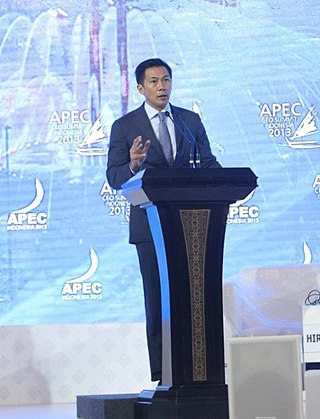Related Research Articles
Industrial and organizational psychology "focuses the lens of psychological science on a key aspect of human life, namely, their work lives. In general, the goals of I-O psychology are to better understand and optimize the effectiveness, health, and well-being of both individuals and organizations." It is an applied discipline within psychology and is an international profession. I-O psychology is also known as occupational psychology in the United Kingdom, organisational psychology in Australia and New Zealand, and work and organizational (WO) psychology throughout Europe and Brazil. Industrial, work, and organizational (IWO) psychology is the broader, more global term for the science and profession.

Leadership, both as a research area and as a practical skill, encompasses the ability of an individual, group, or organization to "lead", influence, or guide other individuals, teams, or entire organizations.
Organizational culture refers to culture related to organizations including schools, universities, not-for-profit groups, government agencies, and business entities. Alternative terms include corporate culture and company culture. The term corporate culture emerged in the late 1980s and early 1990s. It was used by managers, sociologists, and organizational theorists in the 1980s.
Organizational behavior or organisational behaviour is the: "study of human behavior in organizational settings, the interface between human behavior and the organization, and the organization itself". Organizational behavioral research can be categorized in at least three ways:
Organizational climate is a concept that has academic meaning in the fields of organizational behavior and I/O psychology as well as practical meaning in the business world There is continued scholarly debate about the exact definition of organizational climate for the purposes of scientific study. The definition developed by Lawrence R. James (1943-2014) and his colleagues makes a distinction between psychological and organizational climate.
"Psychological climate is defined as the individual employee’s perception of the psychological impact of the work environment on his or her own well-being. When employees in a particular work unit agree on their perceptions of the impact of their work environment, their shared perceptions can be aggregated to describe their organizational climate ."
Conflict management is the process of limiting the negative aspects of conflict while increasing the positive aspects of conflict. The aim of conflict management is to enhance learning and group outcomes, including effectiveness or performance in an organizational setting. Properly managed conflict can improve group outcomes.
Transformational leadership is a theory of leadership where a leader works with teams or followers beyond their immediate self-interests to identify needed change, creating a vision to guide the change through influence, inspiration, and executing the change in tandem with committed members of a group; This change in self-interests elevates the follower's levels of maturity and ideals, as well as their concerns for the achievement. it is an integral part of the Full Range Leadership Model. Transformational leadership is when leader behaviors influence followers and inspire them to perform beyond their perceived capabilities. Transformational leadership inspires people to achieve unexpected or remarkable results. It gives workers autonomy over specific jobs, as well as the authority to make decisions once they have been trained. This induces a positive change in the followers attitudes and the organization as a whole. Transformational leaders typically perform four distinct behaviors, also known as the four Is. These behaviors are inspirational motivation, idealized influence, intellectual stimulation, and individualized consideration.
Elizabeth A. Mannix is the professor of Management and Organizations at Cornell University's Johnson Graduate School of Management, and the Director of the Institute for the Social Sciences at Cornell University. She obtained her PhD from the University of Chicago.
The human resource consulting industry has emerged from management consulting and addresses human resource management tasks and decisions.
Clark L. Wilson was an American industrial psychologist who introduced the concept of 360 feedback surveys for management training and development applications. From 1970-1973 he developed his first 360-degree feedback survey, the "Survey of Management Practices". It was based on a learning sequence he called the Task-Cycle-Theory. Today, 360 feedback surveys of many types are standard tools for management training and development worldwide.
Richard Eleftherios Boyatzis is a Greek-American organizational theorist and Distinguished University Professor in the Departments of Organizational Behavior, Psychology, and Cognitive Science at Case Western Reserve University, Adjunct Professor in People/Organizations at ESADE, as well as HR Horvitz Professor of Family Business. He is considered an expert in the field of emotional intelligence, behavior change, and competence.
Despite a large body of positive psychological research into the relationship between happiness and productivity, happiness at work has traditionally been seen as a potential by-product of positive outcomes at work, rather than a pathway to business success. Happiness in the workplace is usually dependent on the work environment. During the past two decades, maintaining a level of happiness at work has become more significant and relevant due to the intensification of work caused by economic uncertainty and increase in competition. Nowadays, happiness is viewed by a growing number of scholars and senior executives as one of the major sources of positive outcomes in the workplace. In fact, companies with higher than average employee happiness exhibit better financial performance and customer satisfaction. It is thus beneficial for companies to create and maintain positive work environments and leadership that will contribute to the happiness of their employees.
Elwood F. "Ed" Holton III is the Jones S. Davis Distinguished Professor of Human Resource, Leadership, and Organization Development in the School of Human Resource Education and Workforce Development at Louisiana State University where he coordinates their B.S., M.S., and Ph.D. degree programs in Human Resource and Leadership Development.
Martin Kilduff is a British academic. He is the Professor of Management at the UCL School of Management.

Neal M. Ashkanasy is an Australian academic best known for his work on emotions in the workplace. He was honored for his "service to tertiary education, to psychology and to the community." He began his career as a civil engineer but is now a Professor of Management at the University of Queensland Business School.
Cross-cultural psychology attempts to understand how individuals of different cultures interact with each other. Along these lines, cross-cultural leadership has developed as a way to understand leaders who work in the newly globalized market. Today's international organizations require leaders who can adjust to different environments quickly and work with partners and employees of other cultures. It cannot be assumed that a manager who is successful in one country will be successful in another.
Trait leadership is defined as integrated patterns of personal characteristics that reflect a range of individual differences and foster consistent leader effectiveness across a variety of group and organizational situations.

Kathleen Sutcliffe is a Bloomberg Distinguished Professor of Medicine and Business at the Johns Hopkins University Carey Business School and School of Medicine and the Gilbert and Ruth Whitaker Professor Emerita of Business Administration at the University of Michigan Ross School of Business. She studies high-reliability organizations and group decision making in order to understand how organizations and their members cope with uncertainty and unexpected events, with a focus on reliability, resilience, and safety in health care.

Jennifer A. Chatman is an American academic who is the Associate Dean for Academic Affairs and the Paul J. Cortese Distinguished Professor of Management at the Haas School of Business, University of California, Berkeley. Chatman is also the Co-Director of the Berkeley Haas Culture Initiative, the Assistant Dean for Learning Strategies at the Haas School of Business, and Editor for the journal Research in Organizational Behavior.

Daniel J. Pesut is an American nurse educator, academic, researcher and coach. He is an Emeritus Professor of Nursing, Past Director of Katharine J. Densford International Center for Nursing Leadership, and Katherine R. and C. Walton Lillehei Chair in Nursing Leadership at University of Minnesota.
References
- ↑ Professor Dan Denison, Fuculty Vitae @ IMD
- ↑ Daniel R. Denison Archived 2007-07-01 at the Wayback Machine , staff @ Denison Consulting
- ↑ Martin, J. (2002). Organizational culture: Mapping the terrain. Thousand Oaks, CA: Sage Publications. ISBN 978-0-8039-7295-7.
- ↑ Denison, D. R. (1996). "What is the difference between organizational culture and organizational climate? A native's point of view on a decade of paradigm wars" (PDF). Academy of Management Review. 21 (3): 619–654. doi:10.5465/amr.1996.9702100310.
- ↑ The debate on the distinction between organizational culture and climate continues in Ashkanasy, N. M., Wilderom, C. P. M., & Peterson, M. F. (2000). N. M. Ashkanasy; C. P. M. Wilderom; M. F. Peterson (eds.). Handbook of Organizational Culture & Climate. Thousand Oaks, CA: Sage. ISBN 978-1-4129-0482-7.
{{cite book}}: CS1 maint: multiple names: authors list (link), where Daniel Denison is among the contributors - ↑ Carmeli, Abraham; Tishler, Ashler (2004). "The relationship between intangible organizational elements and organizational performance". Strategic Management Journal. 25 (13): 1257–1278. CiteSeerX 10.1.1.335.9791 . doi:10.1002/smj.428.
- ↑ Yilmaz, Cengiz; Ergun, Ercan (2008). "Organizational culture and firm effectiveness: An examination of relative effects of culture traits and the balanced culture hypothesis in an emerging economy". Journal of World Business. 43 (3): 290–306. doi:10.1016/j.jwb.2008.03.019.
- ↑ "Linking Nursing Unit's Culture To Organizational Effectiveness: A Measurement Tool". Nursing Economics. 26 (2). 2008.
- ↑ Daniel R. Denison, Managing organizational change in transition economies , Routledge, 2001
- ↑ Fey, Carl F., Denison, Daniel R. (2003), "Organizational culture and effectiveness: Can American theory be applied in Russia? Archived 2009-08-24 at the Wayback Machine ", University of Michigan